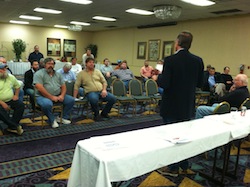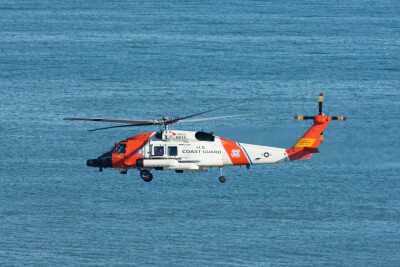The fishermen who attended Tuesday's public workshop in Baton Rouge, La., to talk about reauthorizing the Magnuson-Stevens Act had already had a long day. Many if not all of the approximately 40 folks who came to the session had already attended the Gulf of Mexico Fishery Management Council meeting, also held at the Embassy Suites hotel.
And yet they chose to stay for the Magnuson-Stevens session, the third in the series of workshops co-sponsored by the New Bedford-based Center for Sustainable Fisheries and NF. Previous sessions took place in Seattle and Boston. They came to learn more about the proposals being developed and most importantly, add their thoughts on what was important to fishermen in their region.
Brian Rothschild, the center's president and CEO, then led the informal discussion with the Southern fishermen. He offered a checklist of issues and problems to consider when developing ideas for revising the nation's federal fishing law.
Among those issues was the idea of rewriting the act's National Standards. Rothschild discussed the idea of changing National Standard 1 from focusing primarily on preventing overfishing and secondarily obtaining optimum yield to focusing on maximizing yield or an economic function of yield, subject to constraints on fishing mortality as determined by the management council. The idea is to strengthen the economic component of fisheries management, give the councils more flexibility and facilite better science.
Some fishermen at the session were concerned about the proposal. They noted that in many ways, red snapper has been a success story — and part of that success has come by putting the fish first, creating dependability in the IFQ fishery. In their eyes, anything that diminishes that success would be bad.
The idea of giving the councils more say in setting catch limits gave other fishermen pause. They say the gulf council already sorely lacks commercial sector representation. Giving more power to the most political side of the management process didn't strike them as a good idea.
But there was agreement on other issues, like the need for more and better stock assessments, and allowing longer stock rebuilding time periods. Fishermen recognized that there are problems they experience that fishermen across the country experience, too. And that makes talking about them very worthwhile, especially if it will result in positive change for the nation's fishermen.
I got to kick off the session with brief remarks as NF's representative, then handed the reins to Kate Kramer the center's chief operating officer. Gulf council member Harlon Pearce of Harlon's LA Fish and Bob Gill, owner of Shrimp Landing Seafood, both members of the Gulf Seafood Institute's board of directors addressed the audience as well. Audience members told me afterward they appreciated the workshop being held there, and I heard yesterday that others commented that they found the discussion fruitful, too.
Comments, suggestions and ideas from all three public sessions are being compiled for a final workshop to be held at a date to be determined in Washington, D.C. If you're interested in learning more about the workshop results and where commonalities exist, contact Kate Kramer, the center's chief operating officer.
Photo: Bob Gill of the Gulf Seafood Institute addresses fishermen attending the Magnuson-Stevens reauthorization workshop. Linc Bedrosian photo







